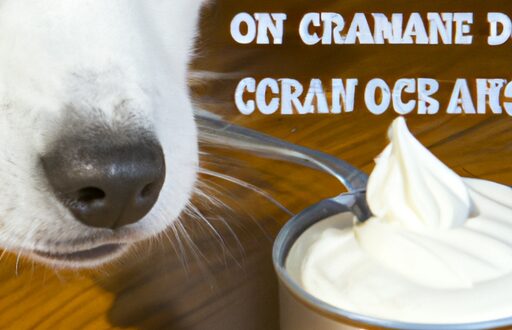Can dogs eat sour cream – Unveiling the Secrets of Canine Palates: The Curious Case of Sour Cream’s Canine Cuisine Compatibility. In the mesmerizing world of culinary curiosities, one question persists in tickling the taste buds of inquisitive pet owners: Can dogs indulge in the tangy delight of sour cream? As our beloved canine companions wag their tails with anticipation every time we open the fridge, it’s only natural to wonder whether this creamy treat can become one more item on their ever-expanding gourmet menu. Join us as we embark on a quest to uncover the truth behind this dairy dilemma, and explore the canine gastronomic universe in an effort to determine whether sour cream is a delectable addition or a forbidden indulgence. Ready your taste buds and buckle up, for this tantalizing tale will undoubtedly leave you yearning for answers!
Table of Contents
1. “Pawsitive or Problematic: Discovering the Canine Compatibility with Sour Cream”
When it comes to our furry friends, we often find ourselves questioning whether certain human foods are safe or harmful to their health. One such food that sparks curiosity is sour cream. Can our canine companions indulge in this tangy delight without any consequences? Let’s delve deeper into the pawsitive and problematic aspects of feeding sour cream to our four-legged buddies.
Pawsitive aspects:
- A yummy treat: Like humans, dogs can be attracted to the creamy texture and tangy taste of sour cream. A small dollop can add a flavorful twist to their meals, making it a delightful treat for their taste buds during the occasional indulgence.
- Protein boost: Sour cream contains significant amounts of protein, which is vital for the development and repair of bodily tissues in dogs. As long as it is consumed in moderation, it can serve as a protein-rich addition to their diet.
- Gut health support: Some dogs may struggle with digestive issues, and a spoonful of sour cream can provide them with beneficial bacteria, such as probiotics, which can aid in balancing their gut flora.
Problematic aspects:
- Lactose intolerance: Many dogs are lactose intolerant, meaning their bodies lack the enzyme needed to digest dairy products properly. Feeding sour cream to these dogs can lead to digestive upset, such as diarrhea, gas, or bloating. It is important to monitor your pet’s reaction and consult with a veterinarian if any symptoms occur.
- High fat content: Sour cream is often high in fat, which can be problematic for dogs, especially those with pancreatitis or weight management issues. Excessive consumption can result in weight gain, obesity, or even pancreas inflammation. Therefore, it is best to limit their portion sizes or opt for low-fat alternatives.
- Additives and seasonings: Store-bought sour cream may contain additives or seasonings like garlic or onion powder, which can be toxic to dogs. Always ensure to read the label carefully and avoid any potential harmful ingredients.
It is crucial to remember that every dog is unique, and their reaction to sour cream may vary. Consult with your veterinarian before introducing sour cream into your dog’s diet and ensure it is given in moderation to ensure their happiness and well-being.
2. “Exploring the Taste Adventure: Can Your Furry Friend Savor Sour Cream Safely?”
When it comes to culinary exploration, even our furry friends can’t resist the taste of different foods. One such delicacy that often catches their attention is sour cream. With its smooth texture and tangy flavor, it’s no wonder why our pets are curious about it. But the question remains: is sour cream safe for them to enjoy?
While many cats and dogs may be tempted by the irresistible aroma of sour cream, it’s important to approach this taste adventure with caution. Here are a few key factors to consider:
- Digestive System: Cats and dogs have different digestive systems than humans, so what may be safe for us can sometimes upset their stomachs. Introducing sour cream in small amounts can help you assess your pet’s reaction and prevent potential digestive issues.
- Lactose Intolerance: Many pets are lactose intolerant, which means their bodies have difficulty digesting lactose, a sugar found in dairy products like sour cream. This can lead to symptoms such as diarrhea, gas, and stomach pain. If your pet shows signs of lactose intolerance, it’s best to avoid feeding them sour cream.
- Nutritional Value: While sour cream may be an exciting treat for our pets, it should only be given in moderation as an occasional addition to their regular diet. Too much sour cream can lead to weight gain and other health issues.
In conclusion, if you find your furry friend eyeing that dollop of sour cream, it’s important to be mindful of their unique dietary needs. While it may be safe for some pets to savor sour cream, others may experience discomfort or digestive problems. Remember, their well-being always comes first, so let their taste adventure be guided by your veterinarian’s advice.
3. “The Scoop on Sour Cream: Unraveling the Mystery of Dogs and Dairy”
When it comes to our furry friends, it’s only natural for dog owners to wonder about the effects of certain human foods on their pets. One often-debated topic in the doggy world is the consumption of sour cream. Is it safe for dogs to eat? Let’s unravel the mystery of dogs and dairy.
First and foremost, it’s important to understand that not all dogs react the same way to dairy products like humans do. While some dogs can handle small amounts of sour cream without any issues, others may experience digestive distress such as diarrhea or gas. If you’re unsure how your dog will react, it’s best to err on the side of caution and consult your veterinarian.
Secondly, it’s crucial to note that sour cream contains high levels of fat and calories. Feeding your dog sour cream regularly can lead to obesity and associated health problems. However, if you decide to give your pooch an occasional treat, make sure it’s a small amount of plain sour cream without any added flavorings, spices, or artificial ingredients.
- Remember that moderation is key, and never make sour cream a significant part of your dog’s diet.
- If your dog does enjoy sour cream without any adverse effects, consider using it as an occasional topper on their regular meals to add flavor.
- When introducing sour cream to your dog’s diet, start with small quantities and closely monitor their reaction. If any digestive issues or allergies arise, discontinue feeding immediately.
In conclusion, while sour cream might be a tasty indulgence for us humans, it’s important to remember that dogs have different dietary needs. While small amounts of plain sour cream can be safe for some dogs, it’s always wise to consult with your vet before making any significant changes to your furry friend’s diet.
4. “To Dip or Not to Dip: Unmasking the Truth Behind Dogs and Sour Cream”
While the culinary world is filled with peculiar combinations, one question has puzzled dog owners for ages – can our furry friends indulge in the velvety allure of sour cream? Today, we’ll dig deep into this creamy mystery and unravel the truth behind dogs and sour cream.
Let’s start with the facts. Contrary to popular belief, sour cream is not necessarily toxic to dogs. It is considered safe in small quantities, as long as the dog does not have an intolerance to dairy products. However, it is essential to exercise caution and moderation, as indulging your canine companion in sour cream could lead to some unwanted side effects.
Here’s what you need to consider:
- 1. Lactose intolerance: Like some humans, dogs can also be lactose intolerant. If your dog experiences gastrointestinal distress after consuming dairy products, it’s best to avoid offering them sour cream.
- 2. High fat content: Sour cream is relatively high in fat. While a small lick or nibble might not harm a healthy dog, excessive consumption can lead to pancreatitis, a painful condition requiring veterinary attention.
- 3. Added ingredients: Be mindful of any added flavors, spices, or additives that could be harmful to your canine companion. Ingredients like onion powder or garlic can be toxic to dogs and are commonly found in flavored sour creams.
If you still wish to indulge your pup in some creamy goodness, a safer alternative is unsweetened and unflavored yogurt. Yogurt contains beneficial probiotics and lower fat content, making it a healthier option for our fur babies.
Remember, a balanced diet that meets your dog’s nutritional needs should always be the priority. While a little dip might seem harmless, consulting with your veterinarian is the surest way to determine what’s best for your furry friend.
5. “A Whisker Away from the Truth: Decoding Canine Reactions to Sour Cream”
Canine reactions to sour cream can be a fascinating area to explore, revealing intricate behaviors and emotions hidden beneath those furry faces. Unleash your curiosity as we delve into the secrets hidden behind every whisker twitch and tail wag when it comes to this creamy condiment.
1. Expressive eyes:
- Dilated pupils: When presented with a dollop of sour cream, pay close attention to your pup’s eyes. Dilated pupils could indicate excitement, anticipation, or even longing for a taste.
- Squinting: On the other paw, squinting eyes may suggest confusion or mistrust towards this unfamiliar addition to their meal.
2. Tell-tail signs:
- Wagging: A wagging tail can indicate a joyful response to sour cream or an overall positive experience. However, every canine is unique, so don’t jump to conclusions too quickly!
- Tail tuck: If you notice your dog tucking their tail between their legs, it may be a subtle sign of nervousness or unease regarding this particular culinary adventure.
Unveiling the truth behind canine reactions to sour cream may not be a walk in the park, but understanding these non-verbal cues can foster a stronger bond between you and your furry companion. So, next time you’re sharing a snack, keep an eye out for those whiskers, as they might just hold the key to your pup’s thoughts and emotions!
6. “The Tasty Tidbit Temptation: Weighing the Pros and Cons of Fido’s Sour Cream Indulgence”
The Tasty Tidbit Temptation: Weighing the Pros and Cons of Fido’s Sour Cream Indulgence
Sometimes, it’s hard to resist those pleading puppy eyes when you’re enjoying a delicious bowl of sour cream-topped nachos. You may be tempted to share a tiny taste with your furry friend, but before you do, it’s important to consider the pros and cons of Fido’s sour cream indulgence.
Pros:
- Taste sensations: Just like us, dogs are capable of enjoying a variety of flavors and textures. Sour cream, with its creamy and tangy profile, might provide an exciting burst of flavor that Fido finds absolutely scrumptious!
- Nutritional benefits: While moderate consumption is key, sour cream contains calcium and protein, which are essential for your dog’s bone and muscle health. These nutrients can support Fido’s overall well-being when included as part of a balanced diet.
- Bonding experience: Sharing a special treat with your dog can strengthen the bond between you. The joy Fido experiences from this simple indulgence might create lasting memories for both of you.
Cons:
- Digestive issues: Dogs’ digestive systems can be sensitive, and sour cream is a dairy product that may not agree with Fido’s stomach. Consumption can lead to diarrhea, upset stomach, or even lactose intolerance symptoms.
- Weight gain: Like with humans, excessive consumption of sour cream can lead to weight gain in dogs. The high-fat content might become an issue, especially if your furry friend is prone to obesity.
- Allergies and intolerances: Some dogs may be allergic or intolerant to dairy products, including sour cream. If Fido displays any adverse reactions, such as itching, ear infections, or skin irritations, it’s best to avoid sour cream altogether.
Ultimately, the decision to indulge Fido with sour cream rests upon considering the benefits and potential risks. It’s always advisable to consult your veterinarian to ensure you are making the best choice for your dog’s individual needs and health.
7. “From Pawsome Probiotics to Potential Pitfalls: Navigating the World of Dogs and Sour Cream
From the curious concoctions of pawsome probiotics to the potential pitfalls of indulging dogs in sour cream, welcome to a whirlwind exploration of the uncharted territory where canines and fermented dairy collide! Strap in, because we’re about to embark on an adventure that will leave tails wagging and taste buds tingling.
First, let’s sink our teeth into the fascinating world of pawsome probiotics. These canine-friendly bacteria powerhouses have gained considerable popularity in recent years, promising to promote a healthy gut flora for our four-legged friends. Whether you choose to introduce these probiotics through supplements or specially-formulated dog foods, they may help support digestion, boost the immune system, and contribute to a shinier coat. However, it’s important to consult your vet before making any dietary changes, as not all dogs may benefit from probiotics and individual needs vary.
Now, let’s jump into the potential pitfalls surrounding the irresistible indulgence of dogs in our beloved sour cream. It’s no secret that many pups find the tangy creaminess utterly irresistible, but caution is warranted. While it may seem harmless to share a dollop of sour cream with your furry friend, it can be problematic due to its high fat content and the potential for lactose intolerance in some dogs. Overconsumption may lead to an upset stomach, pancreatitis, or packed-on pounds. If you choose to treat your dog to a taste, opt for small amounts and ensure that they don’t have any sensitivities or allergies to dairy products.
So, whether you’re navigating the world of pawsome probiotics or carefully avoiding the potential pitfalls of sharing sour cream, remember to consider your furry companion’s dietary needs, consult with professionals, and always approach with moderation. After all, balance and well-informed choices will keep tails wagging and their taste buds satisfied!
Q&A
Q: Can dogs eat sour cream?
A: Yes, in moderation and as a special treat. However, it’s important that you consult with your veterinarian before introducing new items into your dog’s diet. Sour cream contains a good amount of fat and lactose, and some dogs can have a difficult time digesting dairy products. Make sure to feed your pup only plain, unsweetened sour cream and keep portions small.
In Conclusion of can dogs eat sour cream
We hope that this article has provided some helpful insight into whether or not dogs can enjoy sour cream as part of their diets. While some dogs may be able to enjoy a moderate amount of sour cream as a treat occasionally, it’s always best to consult with your veterinarian to make sure any new food is suitable and safe for your pup.
 Treat For Dog – Brain Training for Dogs, Dog Training & Obedience Discover Treat For Dog and get your pup on the path to smarter, happier, and healthier living with brain training for dogs.
Treat For Dog – Brain Training for Dogs, Dog Training & Obedience Discover Treat For Dog and get your pup on the path to smarter, happier, and healthier living with brain training for dogs.




